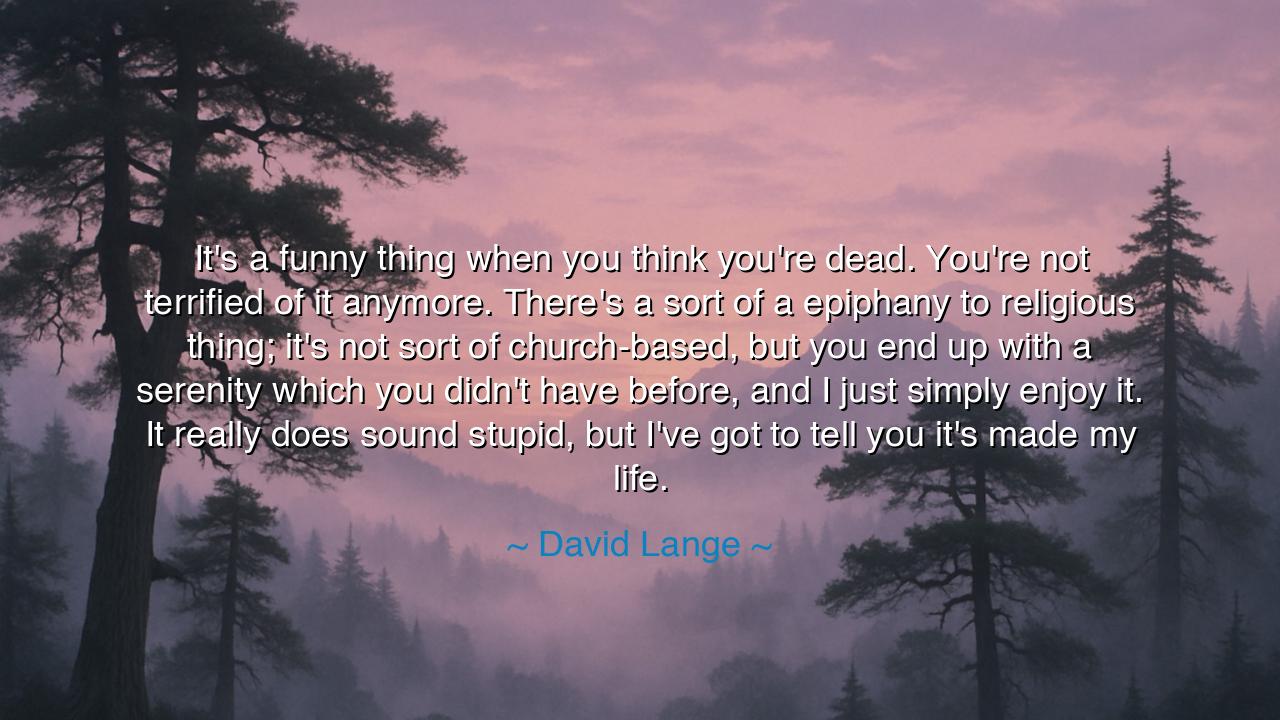
It's a funny thing when you think you're dead. You're not
It's a funny thing when you think you're dead. You're not terrified of it anymore. There's a sort of a epiphany to religious thing; it's not sort of church-based, but you end up with a serenity which you didn't have before, and I just simply enjoy it. It really does sound stupid, but I've got to tell you it's made my life.






Hear now, O children of time and mortality, the words of David Lange, a man who walked through the corridors of power and the shadow of death alike. He said: “It’s a funny thing when you think you’re dead. You’re not terrified of it anymore. There’s a sort of an epiphany to religious thing; it’s not sort of church-based, but you end up with a serenity which you didn’t have before, and I just simply enjoy it. It really does sound stupid, but I’ve got to tell you it’s made my life.” Within these words lies not the jest of the living, but the calm revelation of one who has seen the edge of the abyss and found peace instead of fear. He speaks not as a philosopher in theory, but as a soul who has faced the truth of mortality and been transformed by it.
David Lange, once the Prime Minister of New Zealand, was a man of wit, vision, and compassion. Yet in his later years, illness brought him to confront what so many flee from: the final silence. His words were spoken not from despair, but from awakening. For when he believed himself near death, something within him shifted—the terror of dying fell away, replaced by what he called a “serenity.” This was not the serenity of ritual or creed, but of understanding. He found, as many have before him, that to stand before death without denial is to discover the deepest joy of life. It is as if, in letting go of the struggle to live forever, he learned at last how to live fully.
When he calls this realization a kind of “epiphany,” he touches upon one of the oldest truths known to humankind: that the knowledge of death is the beginning of wisdom. The ancients of every culture knew this. The Stoics of Greece and Rome meditated daily upon mortality, repeating memento mori—remember you must die—not to darken the soul, but to clear it. They believed that in accepting death, a person could no longer be ruled by fear or pride. The Buddha, too, taught that all suffering arises from clinging—from the refusal to accept impermanence. And so, like Lange, those who truly see the brevity of existence find not despair, but freedom.
There is a strange and sacred humor in his words: “It’s a funny thing when you think you’re dead.” It is the humor of one who has discovered the cosmic joke—that we spend our lives running from the inevitable, as if by running we could escape it. Yet once the chase ends, we find, to our astonishment, that there was never anything to fear. Death is not the enemy; it is the mirror that makes life precious. To realize this, as Lange did, is to awaken to serenity, to dwell in a peace that no ambition, wealth, or power can buy.
Consider the story of Marcus Aurelius, the Roman emperor and philosopher. Surrounded by war, betrayal, and loss, he wrote in his Meditations: “Do not act as if you were going to live ten thousand years. Death hangs over you. While you live, while it is in your power, be good.” Like Lange, he found in the awareness of death not paralysis, but clarity. He governed wisely, not because he sought to avoid death, but because he saw life’s true worth through its impermanence. To those who live blindly, time is an enemy; to those who have seen their mortality, time becomes a gift.
Lange’s reflection also reveals the paradox of enlightenment—that it comes not through conquest, but surrender. He says, almost sheepishly, “It really does sound stupid, but it’s made my life.” And yet, the wisdom of the ages often sounds foolish to those who have not lived it. When the fear of death falls away, the noise of ambition, comparison, and anxiety fades as well. In its place grows gratitude—for sunlight, for friendship, for the simple act of breathing. This gratitude, quiet and constant, is the essence of the serenity he describes. It is not tied to religion, but to the divine pulse of existence itself.
Therefore, let this teaching take root in your heart: do not flee from the thought of death—welcome it as a teacher. Reflect upon it not with gloom, but with reverence. Let it remind you that each day is a miracle, that love is urgent, and that kindness is never wasted. When you face mortality with open eyes, you will no longer fear its shadow. You will laugh, as Lange did, at the irony of your old fears. You will find, within that acceptance, the sacred secret of peace.
So, children of the living world, remember this: to think of death is not to lose life, but to reclaim it. For when fear fades, serenity blooms, and in that serenity lies the purest joy—the joy of being here, now, in the fleeting and beautiful light of existence. As David Lange discovered, this revelation may come only once the heart has touched the edge of eternity—but once it does, it makes life, at last, truly your own.






AAdministratorAdministrator
Welcome, honored guests. Please leave a comment, we will respond soon